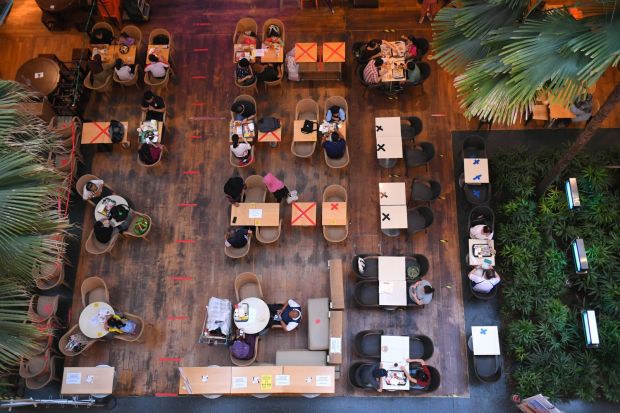Landlords in SEA rethinking operations and strategies
Landlords are turning to innovative means to stay relevant, as Covid-19 has accelerated trends in consumer behaviour, forcing landlords and retailers to rethink their business operations and strategies, said CBRE Research in its latest paper.
In fact, when countrywide lockdowns and home quarantines were first implemented, retail sales in Southeast Asia suffered double digit declines. There has also been a noticeable shift in shopping behaviour.
While necessities such as household supplies and personal care items were largely accessible through physical stores pre-Covid-19, they are now prevalent on online platforms. Shopee Thailand for instance introduced #ShopeeFromHome, giving consumers convenient and affordable access to daily necessities. Its app has seen explosive growth during the pandemic lockdowns, with the number of orders received in April 2020 up by 140 per cent as compared to the same period last year.
Those in the food and beverage industry are also being forced to adapt. In Singapore, traditional hawkers have been forced to change their ways of working, and gain access to food delivery services or tap on existing Facebook groups to expand their customer outreach.
Even as landlords’ roles have evolved over the years from being a point of transaction and display to the inculcation of experiential elements, this has also changed with citywide lockdowns and existing controls on tenant traffic.
Landlords with high reliance on experiential offerings have proven to be the most susceptible, such as in the example of Kidzania Singapore, which shut down its operations after the lockdown. As such, landlords have to think of a new formula, as the new environment does not favour experiential retail trades.
But therein lies an opportunity to rethink their sales model to use technology as a tool to complement sales at its malls, said Desmond Sim and Goh Jia Ling, head of research and manager respectively at CBRE’s Southeast Asia Research team.
Traditionally, technological adaptation was a challenge for many landlords as being the first-mover requires high capital outlay and time. Thailand’s Central Group managed to overcome these challenges by partnering with JD.com, China’s largest retail online retailer. Known as JD Central in Thailand, their online platform and mobile application allows consumers to shop without having to visit their physical mall. Customers are also able to “chat to order” via Line @ Central Chat.
In Singapore meanwhile, CapitaLand launched an e-commerce platform eCapitaMall, and an online food ordering platform Capita3Eats, to complement sales at its malls. It offers shoppers the flexibility to browse online before purchasing in-store or browse in-store before purchasing online. The food ordering platform offers consumers three options – delivery, takeaway, or dine-in.
Separately, landlords of suburban malls can play a central role in logistics, where lockers for self-pickups are placed closer to where the consumers live. This is particularly key in countries that have a higher rural population as these places are currently underserved by e-commerce providers, which lead to higher logistics costs for logistics providers and ultimately consumers, said the report.
Shopping mall developers in the Philippines are already looking at such alternative solutions. As more people are staying at home and shopping online, Ayala Land for instance is considering turning part of its malls into last-mile fulfilment facilities.
As the pandemic persists and individuals become more accustomed to the ease and experience of online retail, there will be greater motivation and fewer perceived barriers to technology, said CBRE.
Vietnam for instance is aiming for double-digit annual growth in the next five years, and more than half of the population is set to shop online by 2025. The government also aims for online shopping to account for 10 per cent of total retail sales by then.
Technology has widened the number of touchpoints for consumers as the consumer journey has been interwoven with the myriad of digital channels besides the traditional brick-and-mortar format. It is hence even more vital for both landlords and retailers to redirect these activities into sales, and to streamline the consumer’s journey to ultimately make a purchase online or offline, said the consultancy.
Source: https://www.businesstimes.com.sg/asean-business/landlords-in-sea-rethinking-operations-and-strategies-0


 Thailand
Thailand




